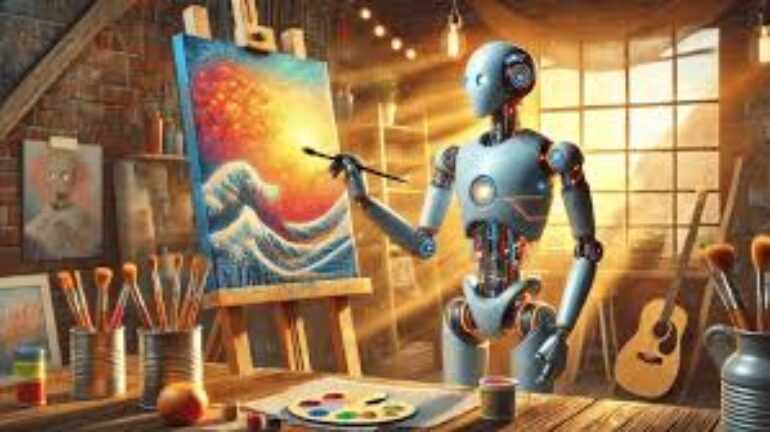
Creativity has long been considered a uniquely human domain a realm where imagination, emotion, and intuition converge to produce art, music, and literature. Today, Artificial Intelligence (AI) is challenging that notion. Generative AI, a subset of AI capable of producing original content, is redefining creative expression and opening new possibilities for artists, musicians, writers, and audiences alike. While some worry that machines may replace human creativity, others see AI as a collaborator that expands the boundaries of what is possible.
At the forefront of this transformation is AI-generated art. Using algorithms such as Generative Adversarial Networks (GANs), AI systems can produce visually striking images that range from hyper-realistic portraits to abstract compositions. Artists are now using AI as a tool to explore new aesthetics, generate ideas, and even co-create works that blend human intention with machine innovation. This approach allows for rapid experimentation, enabling creators to iterate on concepts in ways previously unimaginable. Some AI-generated artworks have already fetched high prices at auctions, signaling both market interest and cultural acceptance.
Music composition is another area experiencing a revolution. AI tools can analyze vast catalogs of existing music, learn patterns, and generate new compositions in specific genres or styles. Musicians can use these systems to create backing tracks, experiment with harmonies, or even produce entirely AI-generated songs. Platforms powered by generative AI allow for personalized music experiences, tailoring compositions to individual listeners’ tastes in real time. Far from replacing human musicians, AI acts as a collaborator, offering inspiration, reducing repetitive tasks, and accelerating the creative process.
In literature and writing, generative AI is transforming storytelling. From poetry to novels, AI can assist authors by suggesting plot developments, generating dialogue, or even drafting entire chapters. Newsrooms are also leveraging AI to produce concise summaries, financial reports, or sports recaps, freeing journalists to focus on investigative reporting and narrative depth. Writers increasingly view AI as a brainstorming partner an idea engine that sparks creativity while leaving the author in control of tone, style, and meaning.
The impact of generative AI extends beyond creation to democratization of creativity. Tools that once required years of training or specialized skills are now accessible to a broader audience. Anyone with access to AI-powered platforms can experiment with art, music, or writing, lowering barriers to entry and fostering a more inclusive creative ecosystem. This democratization challenges traditional hierarchies in the creative industries and encourages diverse voices to contribute to cultural discourse.
However, the rise of generative AI also presents ethical and legal challenges. Questions of authorship and intellectual property are increasingly complex. If an artwork, song, or story is generated by AI, who owns the rights the creator of the algorithm, the user who prompted it, or the AI itself? Furthermore, AI systems can inadvertently replicate biases present in training data, producing content that reflects stereotypes or cultural insensitivity. Addressing these concerns requires thoughtful governance, clear copyright frameworks, and ethical AI design.
There are also philosophical considerations. Can a machine truly “create,” or is it merely recombining patterns from existing data? While AI lacks consciousness, intent, and emotional experience, it can produce outputs that evoke human emotion and provoke reflection. This challenges our understanding of creativity, suggesting that it may be less about intent and more about the capacity to generate meaningful, resonant experiences.
Despite these challenges, generative AI is undeniably expanding the horizons of human creativity. By handling routine tasks, offering new perspectives, and producing ideas at unprecedented speed, AI enables artists, writers, and musicians to focus on higher-level creative decisions. It transforms the creative process from solitary effort into collaborative exploration between humans and machines.
As generative AI continues to evolve, it is likely to redefine the boundaries of art, music, and literature. Far from replacing human creativity, it amplifies it providing new tools, new methods, and new ways to imagine the world. The future of creative expression will be a fusion of human insight and artificial intelligence, a partnership where imagination is limitless and the possibilities for innovation are boundless.
Generative AI reminds us that creativity is not a fixed trait but a dynamic process. By embracing AI as a collaborator rather than a competitor, society can unlock new forms of expression, redefine cultural norms, and explore artistic frontiers that were once unimaginable. The era of AI-powered creativity has arrived, promising a vibrant, transformative future for the arts.